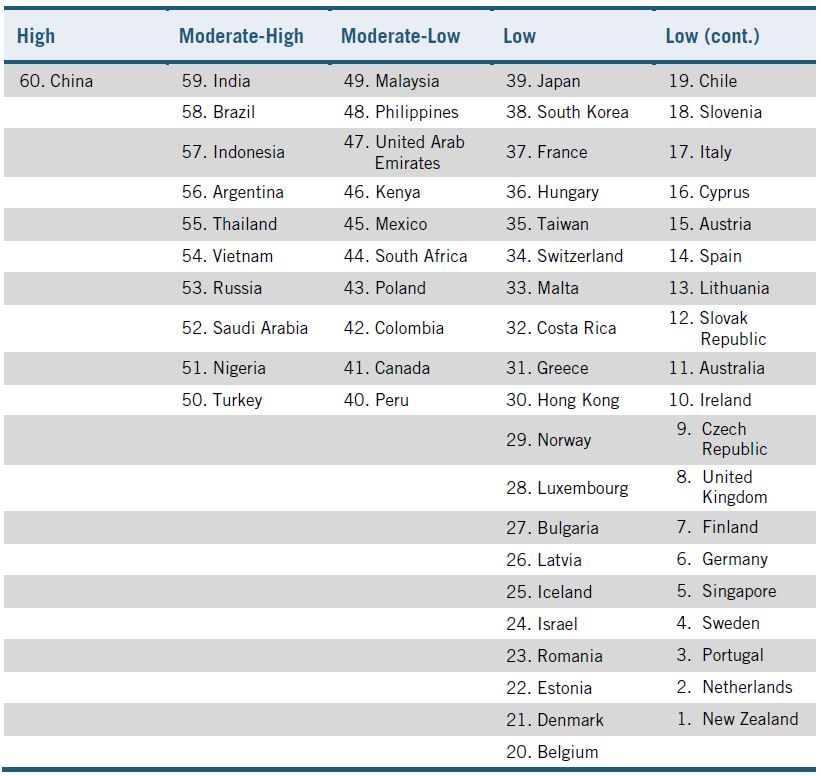The 2019 Global Mercantilist Index: Ranking Nations’ Distortive Trade Policies
The Global Mercantilist Index, ranking 60 nations on 18 variables ranging from market access and forced localization to currency manipulation and intellectual property protections, finds that China is the world’s most innovation-mercantilist nation.
As countries increasingly vie to both achieve the highest levels of innovation-based economic growth and attract, grow, and scale innovative enterprises and industries, a growing number have turned to “innovation mercantilist” policies that seek to grow nations’ innovation-based firms and industries through policies such as local production requirements, export subsidies, weak intellectual property (IP) protection, discrimination against foreign firms, economy-specific technical requirements, and data localization requirements. These policies harm both other nations and global innovation writ large. As such, they demand a coherent and bold response from free-trading nations and multilateral trade and development organizations.
This report updates ITIF’s 2014 report and ranks 60 nations on 18 variables, documenting the extent of their innovation mercantilist practices. It finds that China is the world’s most innovation-mercantilist nation; the only nation in the category of “High.” (See table 1.) In other words, China is in a class of its own when it comes to innovation mercantilism, which is a principal reason much of the Trump administration’s trade policy efforts have focused on trying to get China to at least modestly roll back its egregious practices.
While China ranks the worst, a number of other nations, including India, Brazil, Indonesia, and Argentina, also systemically engage in innovation mercantilist practices, placing in the category of “Moderate-high.” In contrast, New Zealand, the Netherlands, Portugal, Sweden, and Singapore, in that order, engage in the lowest levels of innovation mercantilism. The countries are not evenly distributed across the four tiers, with most nations receiving a rank of “Low” (only China receives a “High”). This reflects the imbalanced nature of mercantilism around the world, whereby a handful of nations have implemented practices that are far more egregious than those of most of the rest of the countries in the world.
The United States is not included in this report, as the structure of the analysis, including analyzing trade-weighted impacts and the effects of countries’ policies toward advanced technology industries, orient the report toward assessing how other nations’ mercantilist practices affect the United States.
This report begins by providing an overview of innovation mercantilism. It then discusses the rationale for creating a Global Mercantilist Index (GMI). Next, the report presents a template and methodology to create such an index. It then lists each individual indicator, and finally proposes a range of policy recommendations.
One of the distinguishing characteristics of innovation mercantilism is that many of its harmful practices are “behind the border”—rather than typical (e.g., the use of tariffs)—which the World Trade Organization (WTO) is less equipped to handle, such as dealing with countries that engage is excessive industrial subsidization. As such, the United States and other like-minded nations need to work to both strengthen the WTO so that it has more tools to push back against these practices, and to identify other mechanisms and institutions that will enable more vigorous prosecution of innovation mercantilism.
Table 1: Global Mercantilist Index rankings (ordered from worst to best in category)

As a first step, ITIF recommends the United States Trade Representative (USTR) construct such an index and issue it at least biennially as a way to better understand these practices and which nations are the worst offenders. This ranking could be used to guide enforcement and other actions to pressure the worst nations. As discussed in the policy recommendations section, these steps could include removing Generalized System of Preferences (GSP) benefits for the nations that rank the worst on this index as well as limiting their ability to receive U.S. foreign aid. The index can also be used as a starting point for international organizations to make decisions about foreign assistance from such organizations as the U.S. Agency for International Development (USAID) and the World Bank.

